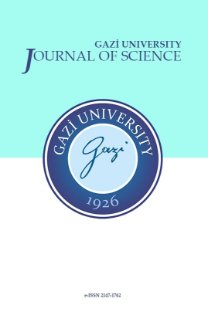Fractional Order Darwinian PSO with Constraint Threshold for Load Flow Optimization of Energy Transmission System
optimization, Power system, Virtual model, Optimal power flow,
___
- [1] Ghanghro, S.P., Sahito, A., Memon, S., Jumani, M., Tunio, S. “Network Reconfiguration for Power Loss Reduction in Distribution System” , Sindh University Research Journal-SURJ, Vol.48, 2016. pp.53-56.
- [2] Ela, E.L., Abou, A.A., ABIDO, M.A., SPEA, S.R. “Optimal power flow using differential evolution algorithm” , Electric Power Systems Research, 2010, 80.7: 878-885.
- [3] Abaci, K., Yamacli, V., Akdağlı, A. “Optimal power flow with SVC devices by using the artificial bee colony algorithm”, Turkish Journal EE &CS; 2016; 24(1), pp.341-353.
- [4] Adaryani, M.R., Karami, A. “Artificial bee colony algorithm for solving multi-objective optimal power flow problem”, International Journal of Electrical Power & Energy Systems;2013; 53: 219-230
- [5] Bouchekara, H.R.E.H. “Optimal power flow using black-hole-based optimization approach” , Applied Soft Computing; 2014; 24: 879-888.
- [6] Zhang, X., Yu, T., Yang, B., Cheng, L. “Accelerating bio-inspired optimizer with transfer reinforcement learning for reactive power optimization”, Knowledge-Based Systems, 2017, 116: 26-38.
- [7] Nikham, T., Rasoul, N.M., Jabbari, M., Malekpour, A.R. “A modified shuffle frog leaping algorithm for multi-objective optimal powe flow” , Energy, 2011, 36.11: 6420-6432.
- [8] Abido, M.A. “Optimal design of power-system stabilizers using particle swarm optimization” , IEEE Transactions on Energy conversion, 2002, 17.3: 406-413.
- [9] Kadir, A.F.A, Mohamed, A., Shareef, H., Wanik, M.Z.C. (2013). “Optimal placement and sizing of distributed generations in distribution systems for minimizing losses and THDv using evolutionary programming” ,TJEE& Comp.Sci., 21, pp. 2269-2282.
- [10] Lahmiri, S., Boukadoum, M. “An evaluation of particle swarm optimization techniques in segmentation of biomedica limages” , In Proceedings of the Companion Publication of the 2014 Annual Conference on Genetic and Evolutionary Computation pp. 1313-1320.
- [11] Xie, W., Li, Y. “An automatic fractional coefficient setting method of FODPSO for hyperspectral image segmentation”, In SPIE Sensing Technology+ Applications (pp. 95010D-95010D). International Society for Opticsand Photonics.
- [12] Ryalat, M.H., Emmens, D., Hulse, M., Bell, D., Al-Rahamneh, Z., Laycock, S., Fisher, M. (2016, September). “Evaluation of particle swarm optimisation for medical image segmentation”, In International Conference on Systems Science pp. 61-72.
- [13] https://hvdc.ca/uploads/knowledge_base/ieee_14_bus_technical_note.pdf? (Last accessed January 18, 2018)
- [14] Kennedy, J., Eberhart, R. A. “new optimizer using particle swarm theory”, In Proceedings of IEEE Sixth International Symposium on Micro Machine Human Science Vol. 34, Issue 2008, pp. 39–43.
- [15] Valle, Y.D., Venayagamoorthy, G.K., Mohagheghi, S., Hernandez, J.C., Harley, R. “Particle swarm optimization: Basic concepts, variants and applications in power systems”, IEEE Transactions on Evolutionary Computation; 2008, 2(2): 171–195
- [16] Tillett, J., Rao, T.M., Sahin, F., Rao, R, Brockport, S. “Darwinian particle swarm optimization”, In B. Prasad (Ed.), Proceedings of the 2nd Indian International Conference on Artificial Intelligence Pune, India; 2008; pp. 1474–1487.
- [17] Pires, E.J., Machado, J.A., Cunha, P.B, Mendes, L. “Particle swarm optimization with fractional-order velocity”, Journal on Nonlinear Dynamics; 2010, 61(1–2): 295–301.
- [18] Couceiro, M.S., Ghamisi, P. “Fractional Order Darwinian PSO: Applications and Evaluation of an Evolutionary Algorithm”, Springer, Londen, 2015.
- [19] Ostalczyk, P.W. “A note on the Grünwald-Letnikov fractional-order backward-difference”, Physica Scripta; 2009; 136, 014036.
- [20] Omkar, S.N., Mudigere, D., Naik, G.N. “Vector evaluated particle swarm optimization (VEPSO) for multi-objective design optimization of composite structures”, Computers & structures, 2008, 86.1: 1-14.
- [21] Ayan, K., Kılıç, U. “Optimal reaktif güç akışının kaotik yapay arı kolonisi ile çözümü”, 6th (IATS’11) 2011, Elazığ-Türkiye, 20-24
- [22] Nachimuthu, D.S., Basha, R.J. “Reactive Power Loss Optimization for an IEEE 14-Bus Power System Using Various Algorithms”, IU-Journal of Electrical & Electronics Engineering; 2014; 14(1), 1737-1744.
- Yayın Aralığı: 4
- Başlangıç: 1988
- Yayıncı: Gazi Üniversitesi, Fen Bilimleri Enstitüsü
Ceren ÜNAL, Selen ÇAKMAKYAPAN, Gamze ÖZEL
Correlation Coefficient Based Feature Selection Framework Using Graph Construction
Sai Prasad POTHARAJU, Marriboyina SREEDEVI
Ozan AKDAĞ, Fatih OKUMUŞ, Adnan Fatih KOCAMAZ, Celaleddin YEROĞLU
Rajendrasinh JADEJA, Akash FALDU, Tapankumar TRIVEDI, Siddharthsingh CHAUHAN, Vinod PATEL
Mustafa SEVİNDİK, Mustafa PEHLIVAN, Muhittin DOGAN, Zeliha SELAMOGLU
The Distribution of Angular Flux for Slab Albedo Problem
An Unsupervised Approach for Selection of Candidate Feature Set Using Filter Based Techniques
